|
|
|
Sort Order |
|
|
|
Items / Page
|
|
|
|
|
|
|
| Srl | Item |
| 1 |
ID:
124312
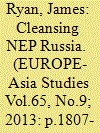

|
|
|
|
|
| Publication |
2013.
|
| Summary/Abstract |
This essay offers a case study of how the Bolshevik state reacted to popular, sometimes violent, opposition and resistance to its policies during the early period of New Economic Policy. The case study concerns the ruling Bolshevik Party's repressive approach to the Russian Orthodox Church in 1922. This culminated in show trials and executions of clergy and lay believers in response to resistance throughout the country to the state's campaign of collecting church valuables that year, ostensibly to provide relief for victims of a catastrophic famine that afflicted much of southern Russia in 1921-1922.
|
|
|
|
|
|
|
|
|
|
|
|
|
|
|
|
| 2 |
ID:
124311
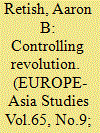

|
|
|
|
|
| Publication |
2013.
|
| Summary/Abstract |
This essay is a study of how Soviet jurists and rural citizens attempted to understand and control illicit social violence during the Civil War and its immediate aftermath in the rural courts. It examines how Soviet leaders, people's courts and criminologists understood the role of the courts in controlling violence and how decisions of local courts actually limited the effects of the violence of revolution and civil war. It underscores the complexity of violence and the need to understand state and peasant attempts to control social violence in an age marked by political, state violence.
|
|
|
|
|
|
|
|
|
|
|
|
|
|
|
|
| 3 |
ID:
124310
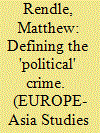

|
|
|
|
|
| Publication |
2013.
|
| Summary/Abstract |
After the October Revolution, the Bolsheviks established revolutionary tribunals to judge 'counter-revolutionary' and 'political' crimes. Amid conflicting reports from contemporaries on the effectiveness of these new courts, this essay examines their development over the first year of their existence. It argues that whilst tribunals were initially too inefficient for the regime, forcing greater central control over them, they played an important role in defining what constituted counter-revolution. In doing so, they promoted the regime's ideology, imparted an image of legality to the regime's actions, and helped the Bolsheviks to exert their control over a fragmented and diverse political landscape.
|
|
|
|
|
|
|
|
|
|
|
|
|
|
|
|
| 4 |
ID:
124305
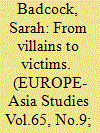

|
|
|
|
|
| Publication |
2013.
|
| Summary/Abstract |
This essay presents the subjective experience of life and sickness for the punished in late Imperial Siberia, and the distinctions the punished made between legitimate and illegitimate forms of punishment. The essay also explores state policies towards the sick punished, and explores how different levels of the Tsarist administration and local Siberian society dealt with the challenge of sick and decrepit exiles. It argues that conditions in Siberian prisons were, in general, worse than those in European Russian prisons in the post-1906 period, and that the experience of exile in eastern Siberia placed it among the most difficult locations for exile. Though neither the state nor the punished regarded illness as an integral part of their punishment, the prevalence of illness and disease compounded the cruelty of sentences.
|
|
|
|
|
|
|
|
|
|
|
|
|
|
|
|
| 5 |
ID:
124300
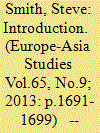

|
|
|
|
|
| Publication |
2013.
|
| Summary/Abstract |
The essays in this collection focus in different ways on the ambiguities and paradoxes of 'villains' and 'victims' in late-Imperial Russia and the early Soviet Union. They derive from a conference on 'Villains and Victims: Justice, Violence and Retribution in Late-Imperial and Early Soviet Russia', which was organised by Sarah Badcock and took place at the University of Nottingham on 6-7 April 2010. The title of the conference had a certain alliterative charm, which is compounded by the fact that most of the essays in this collection also concern violence: violence being the terrain on which villains and victims tended to meet.
|
|
|
|
|
|
|
|
|
|
|
|
|
|
|
|
| 6 |
ID:
124303
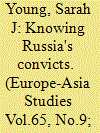

|
|
|
|
|
| Publication |
2013.
|
| Summary/Abstract |
The essay explores the significance of questions of knowledge to the depiction of prisoners in three prominent katorga narratives from the second half of the nineteenth century: Dostoevskii's Notes from the House of the Dead, Kennan's Siberia and the Exile System, and Chekhov's Sakhalin Island. Comparing the different discourses of unknowability these authors employ, it argues that the relationship of the writers or narrators to the outcast status of the convicts takes their texts beyond the immediate context, to shape views of the penal system as expressing the increasing instability of identity, social hierarchies and moral life in Russia.
|
|
|
|
|
|
|
|
|
|
|
|
|
|
|
|
| 7 |
ID:
124313
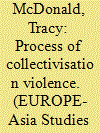

|
|
|
|
|
| Publication |
2013.
|
| Summary/Abstract |
This article attempts to conceptualise violence, and to determine the value of that concept as a lens through which to understand the Soviet collectivisation drive and its legacy. The central claim is that objective violence, the very real experience of the collectivisation drive, becomes subjective violence as it is internalised over time. In the context of the process of collectivisation violence, the lines between victims and perpetrators were blurred in important ways. The end of the Soviet Union triggered a re-evaluation of the meaning of that violence which is still in a state of flux today.
|
|
|
|
|
|
|
|
|
|
|
|
|
|
|
|
| 8 |
ID:
124309
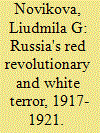

|
|
|
|
|
| Publication |
2013.
|
| Summary/Abstract |
This essay re-examines White and Red terror during the Russian Civil War by studying public participation in the acts of political violence. It shifts attention from the ideological and political motifs of terror to places and contexts where violence occurred. On the example of paramilitary groups of White and Red partisans in Arkhangel'sk province in the Russian North, it demonstrates how local factors, such as the nearby frontline, poor economic conditions or traditional enmity between neighbouring communities, contributed to the escalation of terror at a grass-root level.
|
|
|
|
|
|
|
|
|
|
|
|
|
|
|
|
| 9 |
ID:
124306


|
|
|
|
|
| Publication |
2013.
|
| Summary/Abstract |
Any meaningful attempt to understand how the Soviet system evolved and 'worked' must take into account not only those who conformed ideologically, but also those who actively embraced alternative frameworks of meaning. This paper centres on the experience of a young factory worker, Petr Terekhovich, who, in the mid-1920s, abandoned 'godlessness' to devote himself to the charismatic lay preacher, Brother Ioann Churikov, and to a highly ascetic, scripture-based form of sobriety. Drawing largely on archival materials, it seeks to understand Terekhovich's story as a case study of religious struggle, belief and activism, an account of persecution by atheist officials, and ultimately, a narrative of resistance, spiritual freedom and self-determination under Soviet rule.
|
|
|
|
|
|
|
|
|
|
|
|
|
|
|
|
|
|
|
|
|